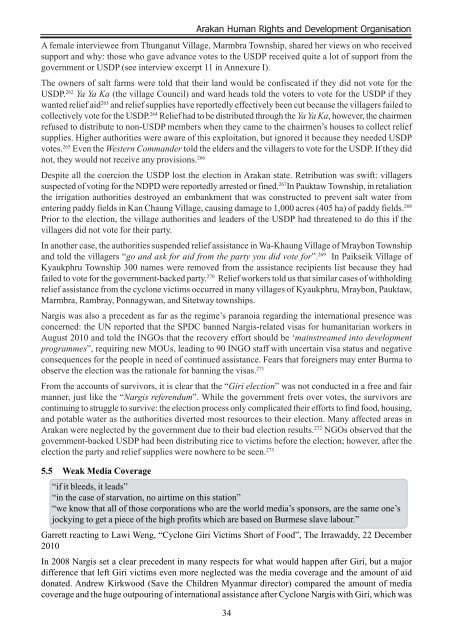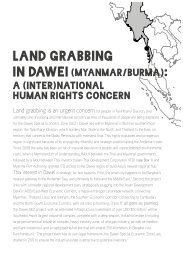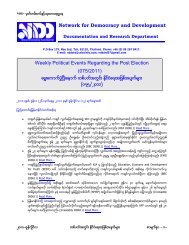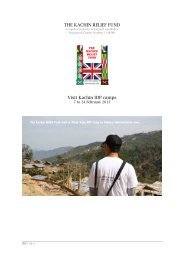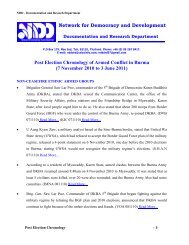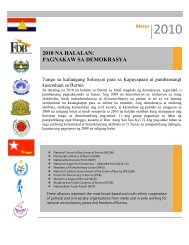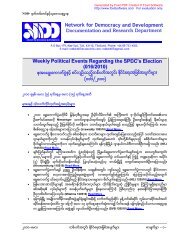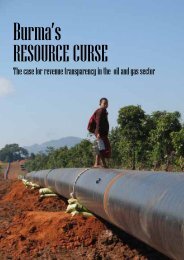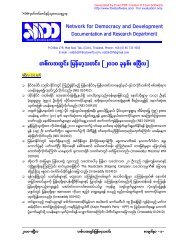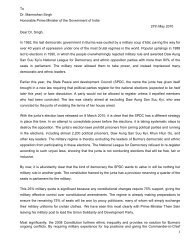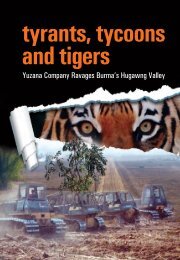Cyclone Giri - Two Years On - Burma Action Ireland
Cyclone Giri - Two Years On - Burma Action Ireland
Cyclone Giri - Two Years On - Burma Action Ireland
Create successful ePaper yourself
Turn your PDF publications into a flip-book with our unique Google optimized e-Paper software.
Arakan Human Rights and Development Organisation<br />
A female interviewee from Thunganut Village, Marmbra Township, shared her views on who received<br />
support and why: those who gave advance votes to the USDP received quite a lot of support from the<br />
government or USDP (see interview excerpt 11 in Annexure I).<br />
The owners of salt farms were told that their land would be confiscated if they did not vote for the<br />
USDP. 262 Ya Ya Ka (the village Council) and ward heads told the voters to vote for the USDP if they<br />
wanted relief aid 263 and relief supplies have reportedly effectively been cut because the villagers failed to<br />
collectively vote for the USDP. 264 Relief had to be distributed through the Ya Ya Ka, however, the chairmen<br />
refused to distribute to non-USDP members when they came to the chairmen’s houses to collect relief<br />
supplies. Higher authorities were aware of this exploitation, but ignored it because they needed USDP<br />
votes. 265 Even the Western Commander told the elders and the villagers to vote for the USDP. If they did<br />
not, they would not receive any provisions. 266<br />
Despite all the coercion the USDP lost the election in Arakan state. Retribution was swift: villagers<br />
suspected of voting for the NDPD were reportedly arrested or fined. 267 In Pauktaw Township, in retaliation<br />
the irrigation authorities destroyed an embankment that was constructed to prevent salt water from<br />
entering paddy fields in Kan Chaung Village, causing damage to 1,000 acres (405 ha) of paddy fields. 268<br />
Prior to the election, the village authorities and leaders of the USDP had threatened to do this if the<br />
villagers did not vote for their party.<br />
In another case, the authorities suspended relief assistance in Wa-Khaung Village of Mraybon Township<br />
and told the villagers “go and ask for aid from the party you did vote for”. 269 In Paikseik Village of<br />
Kyaukphru Township 300 names were removed from the assistance recipients list because they had<br />
failed to vote for the government-backed party. 270 Relief workers told us that similar cases of withholding<br />
relief assistance from the cyclone victims occurred in many villages of Kyaukphru, Mraybon, Pauktaw,<br />
Marmbra, Rambray, Ponnagywan, and Sitetway townships.<br />
Nargis was also a precedent as far as the regime’s paranoia regarding the international presence was<br />
concerned: the UN reported that the SPDC banned Nargis-related visas for humanitarian workers in<br />
August 2010 and told the INGOs that the recovery effort should be ‘mainstreamed into development<br />
programmes”, requiring new MOUs, leading to 90 INGO staff with uncertain visa status and negative<br />
consequences for the people in need of continued assistance. Fears that foreigners may enter <strong>Burma</strong> to<br />
observe the election was the rationale for banning the visas. 271<br />
From the accounts of survivors, it is clear that the “<strong>Giri</strong> election” was not conducted in a free and fair<br />
manner, just like the “Nargis referendum”. While the government frets over votes, the survivors are<br />
continuing to struggle to survive: the election process only complicated their efforts to find food, housing,<br />
and potable water as the authorities diverted most resources to their election. Many affected areas in<br />
Arakan were neglected by the government due to their bad election results. 272 NGOs observed that the<br />
government-backed USDP had been distributing rice to victims before the election; however, after the<br />
election the party and relief supplies were nowhere to be seen. 273<br />
5.5 Weak Media Coverage<br />
“if it bleeds, it leads”<br />
“in the case of starvation, no airtime on this station”<br />
“we know that all of those corporations who are the world media’s sponsors, are the same one’s<br />
jockying to get a piece of the high profits which are based on Burmese slave labour.”<br />
Garrett reacting to Lawi Weng, “<strong>Cyclone</strong> <strong>Giri</strong> Victims Short of Food”, The Irrawaddy, 22 December<br />
2010<br />
In 2008 Nargis set a clear precedent in many respects for what would happen after <strong>Giri</strong>, but a major<br />
difference that left <strong>Giri</strong> victims even more neglected was the media coverage and the amount of aid<br />
donated. Andrew Kirkwood (Save the Children Myanmar director) compared the amount of media<br />
coverage and the huge outpouring of international assistance after <strong>Cyclone</strong> Nargis with <strong>Giri</strong>, which was<br />
34


